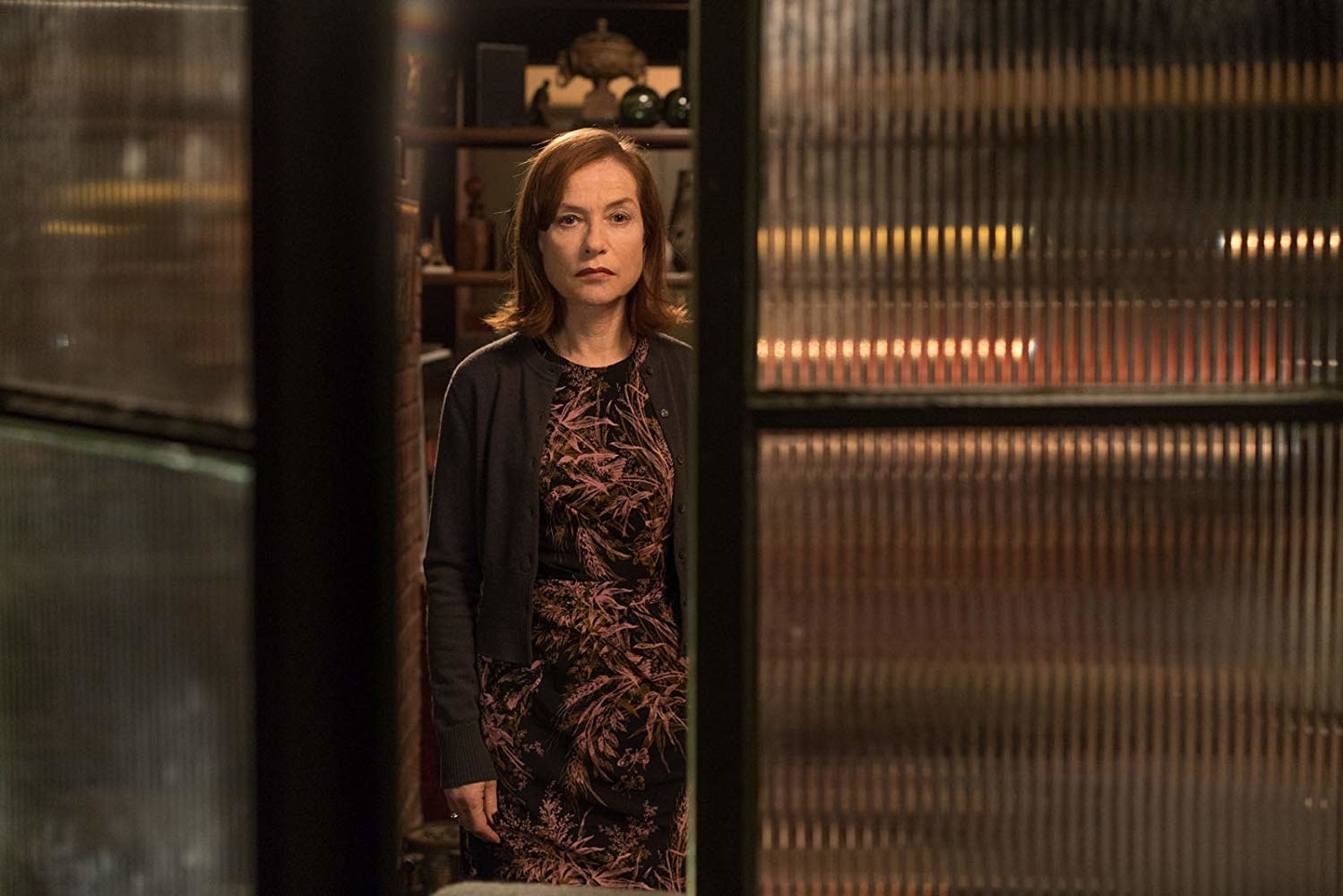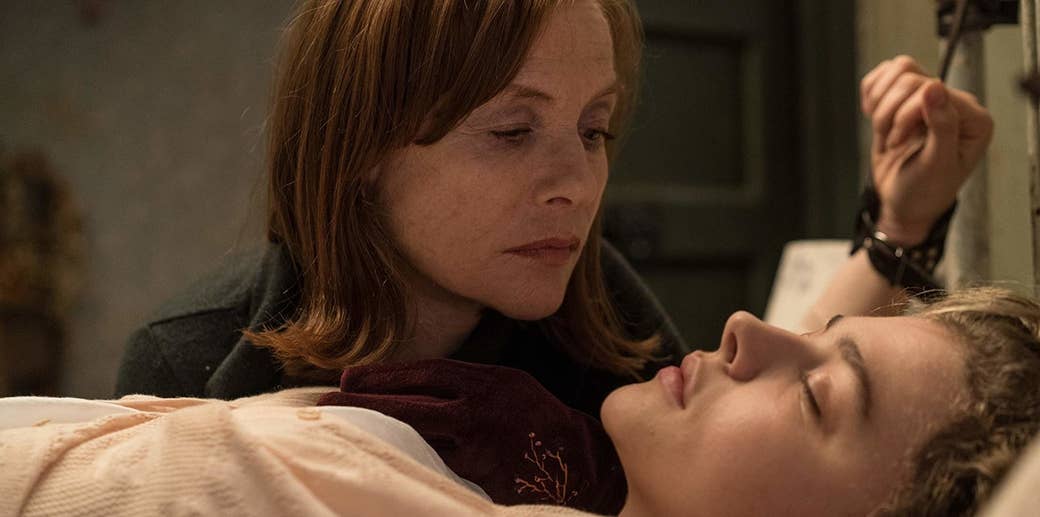
Isabelle Huppert wore a cat on the January cover of Vanity Fair France. Technically, she carried the handsome, sinewy Bengal in her arms, but the cat was just as much a part of her look as her white dress, snarling as if assigned the task of communicating the pair's shared inner wildness. Huppert's expression was less readable, everything channeled through her eyes. Her chin was tilted up, and the flip of her hair suggested movement, as though she'd just whirled around to face a foe. She arched an eyebrow and stared down the camera as though challenging it to a duel.
It was a hell of a shot, even if it was, like so many magazine covers, overenthusiastically retouched — an image that suggested the point of the photo was not for us to get a look at the diminutive acting icon, but for her to take a coolly assessing look at us. It's tempting to joke about how it probably helps to be French when attempting to get away with a promotional pose this confrontational, but the reality is more specific. What really helps is being Isabelle Huppert, a woman who's built a career out of refusing to cater to the comfort of those watching her, and who's never seemed to feel the need to blunt her sharp edges.
Huppert turns 66 on March 16. She is a tirelessly prolific performer, having racked up well over a hundred screen credits since she got her start as a teenager. Most of those roles have been in her native tongue, but she's made occasional, memorable forays into English-language work, from her Québécois madam in Michael Cimino's 1980 film maudit Heaven's Gate to her appearance as a grief-stricken hostage-taker in an episode of Law & Order: SVU. Greta, currently in theaters, is the latest one, casting Huppert as a lonely widow who scatters purses on the subway in hopes of luring a good Samaritan to her Brooklyn backhouse to keep her company — a dark fairy tale set in a New York that looks all the more dreamlike for clearly being shot in Toronto.
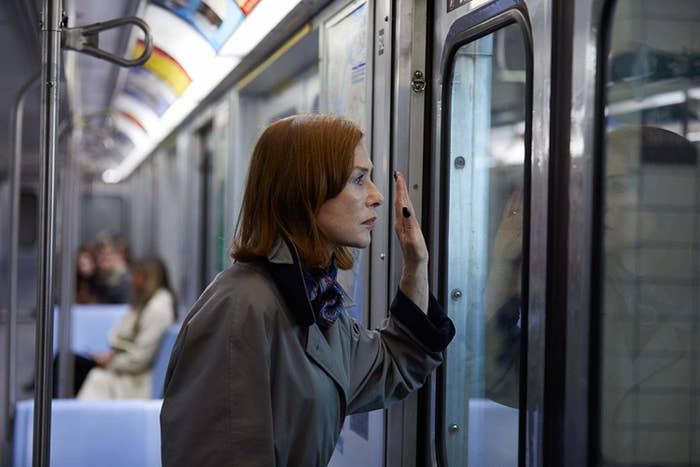
The film, directed by Neil Jordan, is a thriller, but more than that, it's a specialized act of fan service. Huppert's celebrity in the US has been of the more specialized, arthouse variety, though she has devoted admirers (among them If Beale Street Could Talk director Barry Jenkins, who's carried out a sustained stan campaign). It was only a few years ago that she received her first, and so far only, Oscar nomination, for a doozy of a starring role in Paul Verhoeven's 2016 Elle. The fact that the Academy went for a film that could be summed up, in inflammatory but not inaccurate terms, as a rape-revenge black comedy, is still surprising. The fact that Huppert did is not at all — her filmography is too sprawling to support any one generalization, but a consistent theme in it has been a willingness to take on work that's difficult, transgressive, shocking, and downright grueling.
Which isn't to say that she's a provocateur. Provocateurs want to get a rise out of their audience, and Huppert never seems to give a damn about how her audience reacts at all. It's an indifference that's both powerful and gloriously terrifying. Most actors, whether they're chameleons who disappear into roles or movie stars who mostly just play themselves, have an acute awareness of their own likability and how it figures into the way they're perceived.
It's a burden that's been settled particularly heavily on women, who still have, in life and onscreen, to contend with different and ever-shifting expectations about looks and behavior. But Huppert doesn't seem to feel that weight — "I never thought that cinema has to idealize characters to make them more romantic or likable than they are. I need to have empathy. But you can have empathy for a non-likable character," she told the AP in 2017. She's willing to be as flinty, opaque, or off-putting as needed; she doesn't soften characters in order to make them more accessible. At the same time, when she takes on roles that are risky, she doesn't treat them as such.
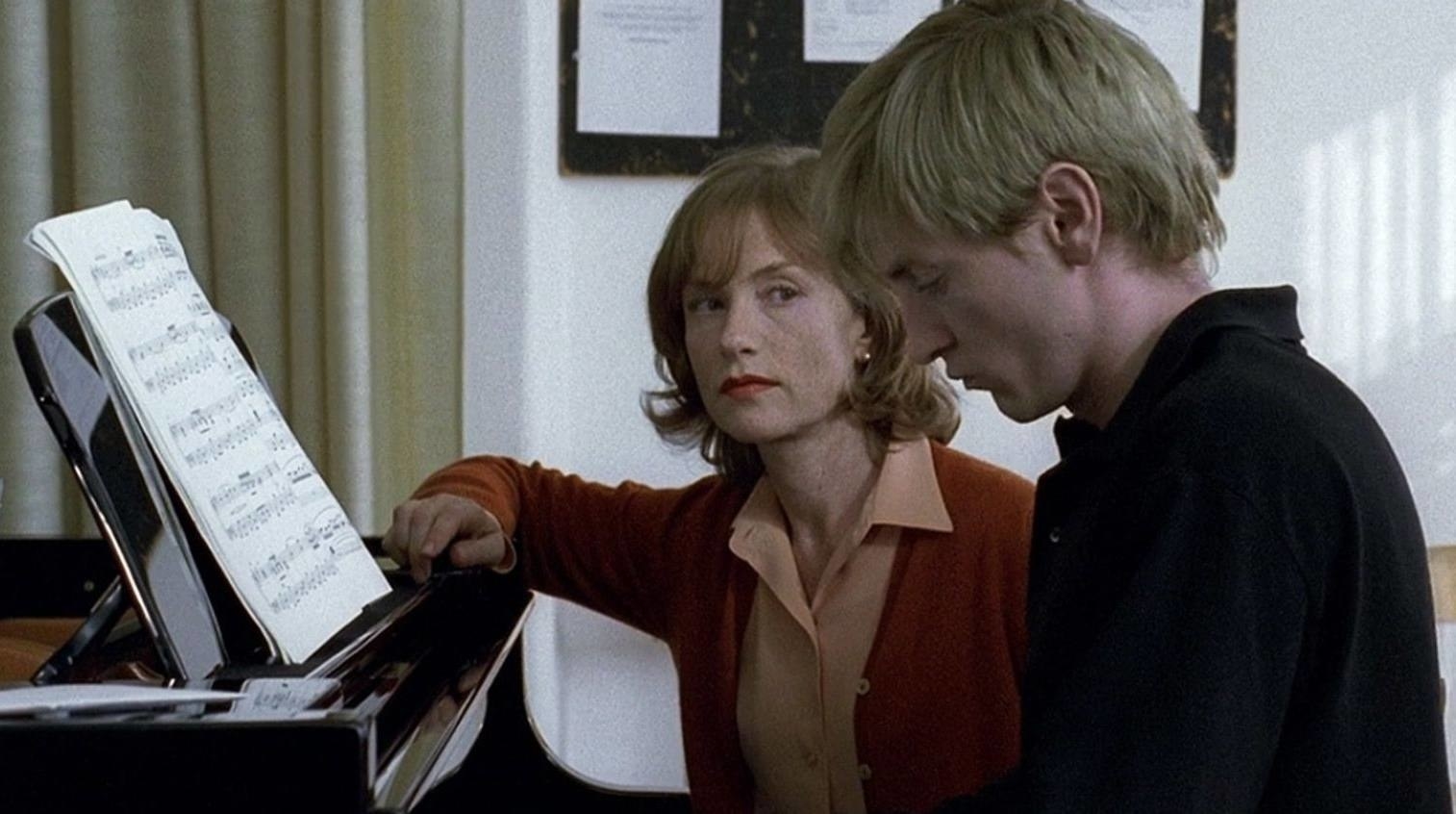
It's the kind of approach that gives such disconcerting gravity to what may be her defining role, as Erika Kohut in Michael Haneke's 2001 The Piano Teacher. Erika's a music instructor and performer who lives a constrained life under the thumb of a controlling mother who treats her like she’s still a child instead of a woman hovering somewhere near the age of 40. But when a puppyish student named Walter (Benoît Magimel) makes a move on her, he finds she isn’t a tightly wound spinster dreaming of being swept her off her feet, but a masochist whose longings fall within the realms of both kink and paraphilia. In an infamous scene, Erika slices her own vulva with a razor while perched on the edge of a bathtub — an act Haneke frames with clinical distance, and that Huppert plays with the matter-of-factness of a woman enacting a private ritual as familiar to her as brushing her teeth.
Central to many of her characters is a sense that they are not reacting — to grief, to desire, to motherhood — the way society has instructed them to.
The Piano Teacher is what you might call a tough sit, a character portrait that's designed to be alienating. But that's also what makes it fascinating— Huppert is all banked fire, playing a character whose roiling and underexplored desires haven't really been witnessed by anyone around her, even the men at the sex shops who uncomfortably side-eye the austere woman waiting for her turn in a back room. With Walter now in the picture, the possibility of truly being seen thrills and terrifies Erika, though of course we in the audience have seen the full being behind the carefully composed exterior all along. The Piano Teacher concludes with an incredibly difficult sequence in which Erika either gets what she was searching for or experiences a monstrous betrayal, and the film refuses to provide a hint as to which is the definitive read. Huppert's face expresses immense but unreadable emotion — she channels pain without needing to explain the cause of it.
Erika is one of the roles that's helped slowly cement a place for Huppert as, among other things, a queen of darkness. In Claude Chabrol's 1991 Madame Bovary, she takes arsenic and dies a prolonged (and aspirationally goth) death, writhing pallid and clammy in bed, hallucinating and vomiting up black bile. In another Chabrol film, 1995's La Cérémonie, she emerges as the domineering half of a dysfunctional and damaged friendship that ramps up into class rage and resentment-driven violence. In Christophe Honoré's lurid 2004 Ma Mère, she's a libertine whose sexual adventures have her circling closer and closer to her own son, bringing them to a sex-and-death climax that could make even the hardiest of moviegoers wince. Central to many of her characters is a sense that they are not reacting — to grief, to desire, to motherhood — the way society has instructed them to; their reactions are, instead, outside the realm of normalcy.
That is, essentially, what Elle is about. It opens with a brutal sexual assault, but its focus is the aftermath, and how Huppert's character, Michèle, opts to handle her own recovery by initiating consensual, if wildly uneasy, sexual contact with the man who attacked her. It's not a conventional or, by any standard definition, healthy means of addressing trauma, but Elle can be seen as an argument about the constraints of those concepts. Michèle is a woman whose childhood was shaped by the atrocities committed by her mass-murdering father — her reactions to which were deemed incorrect by a judgmental public. She doesn't react in a way that the public might consider appropriate to her own rape, either, and she has reasons to distrust how women are treated when they don't fit the image of a good victim.
Meanwhile, her assailant, a rapist hiding in plain sight as the cheery married man next door, is shielded by the same sense of normalcy that could be used against her. Verhoeven's film has its missteps (including an instance in which Michèle puts herself in physical peril in a way that feels out of character for a woman who is all about reclaiming control), but the faults aren't Huppert's. She plays a woman whose most wonderfully withering quality is her inability to let anyone treat her like a supporting figure in their lives — not when hers are the experiences that matter.
Huppert's unfussy fearlessness as a performer isn't exclusive to incendiary material. The same year that Elle premiered, she brought the same unflashy commitment to a starring turn as a philosophy professor dealing with loss on multiple fronts in Mia Hansen-Løve's exquisite 2016 Things to Come. There's a perfect moment in that movie in which her character, crying on the bus, spots her husband walk by with his new lover and lets out a bark of astonished and astonishing laughter at the absurdity of it all.
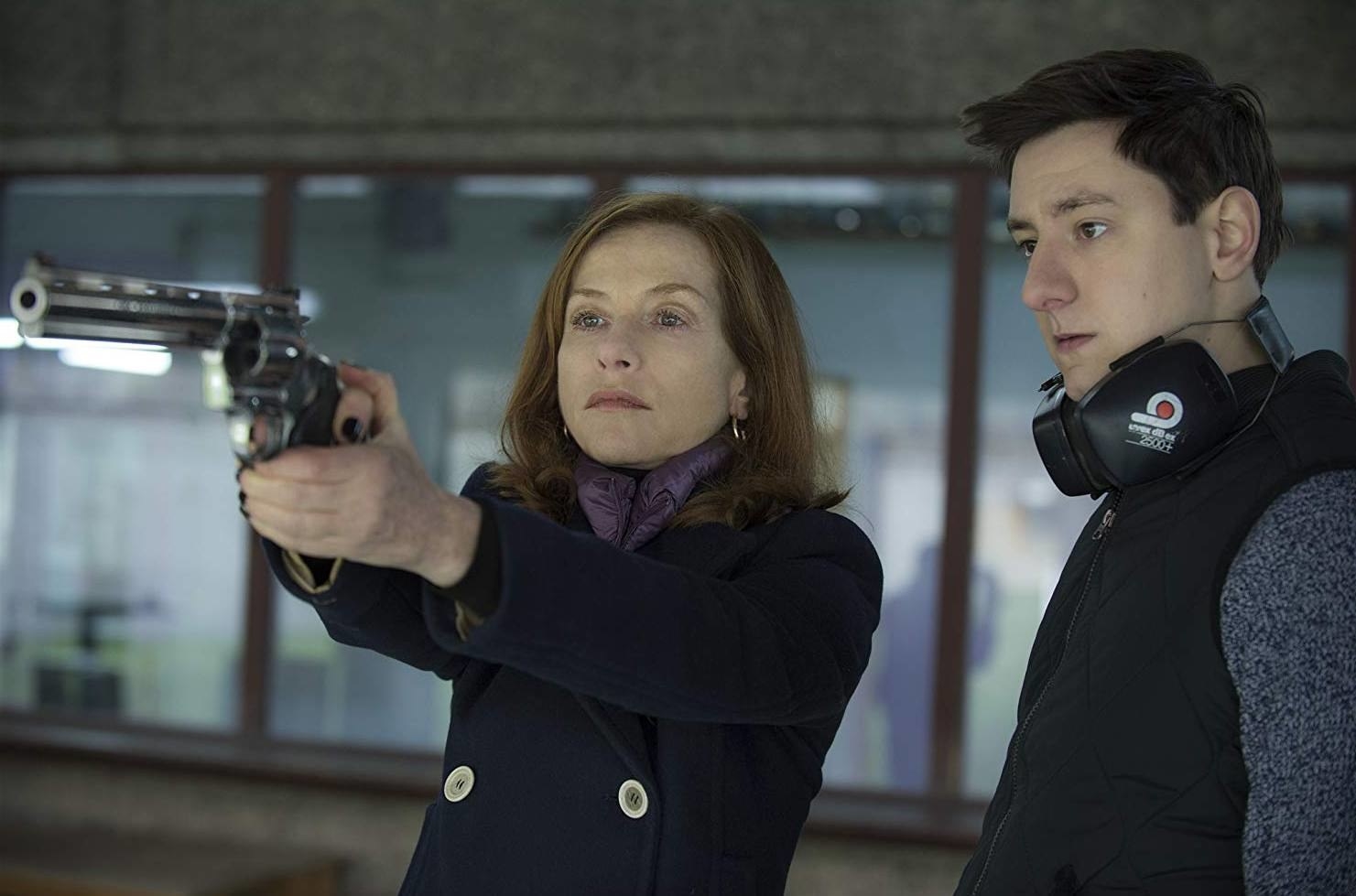
The contrast between the striking, ageless figure Huppert cuts onscreen and the dark depths her characters so often contain makes her approach to acting feel like that of playing the tip of an iceberg — something true whether she's in a movie that's meant to disturb or delight.Greta attempts, and manages, to do both. The trick of the movie, and the reason it works, is that Chloë Grace Moretz plays things straight as the naive heroine Frances, while Huppert leans into the outrageousness of her character, flipping tables, spitting gum into Frances's hair, and dancing away after an assault on stockinged feet like a demented ballerina. It's as though she's been let in on a secret, unlike the rest of the cast — that the film they're all in is as much dark comedy as it is horror. Its best joke is that her character isn't Parisian at all — she's a Hungarian who's committed to some serious rebranding. That's a bit like casting Hugh Grant as a man who's been faking a British accent for years, but it also feels like a jab at the idea of Gallic mystique and what it allows people to get away with.
Huppert, who's been cast as parodically French before (in I Heart Huckabees, she’s a chic nihilist cooing lines like "It is inevitable to be drawn back into human drama"), here plays a woman who easily cloaks her psychopathy under silk scarves and stylish trenches. At one point, Greta even books at table at the restaurant at which Frances is a server in order to sneer at her wine recommendations — a truly American nightmare. It's hard not to think of Huppert's character in The Piano Teacher when watching Greta — the two women love the same instrument, though they prefer different composers, and they're both alarmingly strict with their pupils, though one prefers to maim and the other to murder. They're spiritual siblings, both living in their own tastefully furnished isolation, their attempts to reach out to connect with others somehow ending with their claws out instead.
Maybe that's why it's such a particular pleasure watching Huppert in her latest turn — because it feels like an homage to a past role of hers as well as a way of liberating that character into the realms of camp. It's just as compelling to watch Huppert kick off her heels and let her freak flag fly as it is to watch her burn bright. There's more than one way to be scary, Huppert knows, and we're lucky enough to get to see them all. ●
